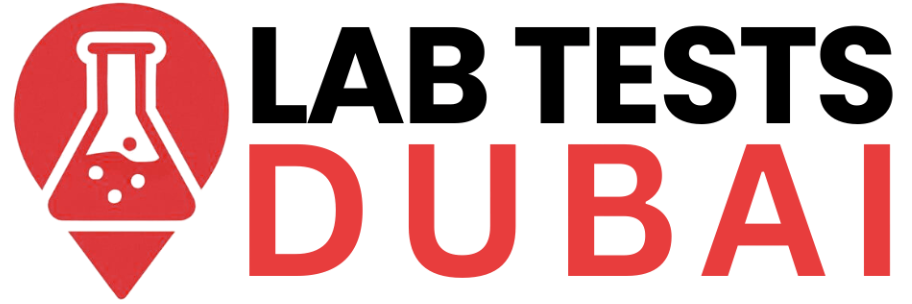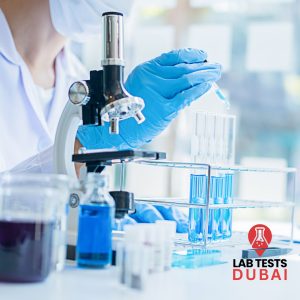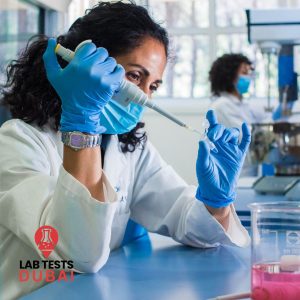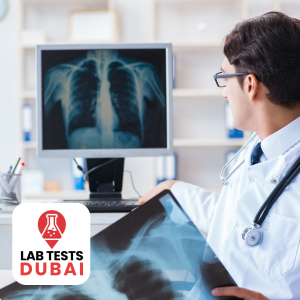
High-Quality Immunohistochemical Stain Tests for Accurate Diagnostics
1.050,00 د.إ
Immunohistochemical (IHC) Stain tests are advanced diagnostic tools used to detect specific antigens in tissue samples, aiding in disease diagnosis, particularly cancer. These tests utilize highly specific antibodies to identify cellular markers, enabling precise differentiation between tissue types and disease states.
Sample Type : Paraffin Embedded Block/Charged Slides
Methodology : Immunohistochemical
TAT : 5 days
Description
Immunohistochemical Stain: A Comprehensive Diagnostic Tool for Tissue Analysis
The Immunohistochemical (IHC) Stain service from Lab Tests Dubai is a powerful, precision-based diagnostic technique used in histopathology and cytology to detect and localize specific proteins, antigens, and biomarkers within formalin-fixed, paraffin-embedded (FFPE) tissue sections.
Using highly specific monoclonal and polyclonal antibodies, this test enables pathologists to:
- Identify tumor origin and type
- Confirm cancer subtypes (e.g., breast, lymphoma, neuroendocrine)
- Detect infectious agents (e.g., HPV, EBV, fungi)
- Diagnose autoimmune and inflammatory conditions
- Guide targeted therapy and prognosis
With a 5-day turnaround time, Lab Tests Dubai delivers accurate, reproducible IHC results—supporting hospitals, cancer centers, and pathology labs in delivering personalized, evidence-based diagnoses.
Available for tissue blocks or charged slides, this service integrates seamlessly into your diagnostic workflow.
Why You Need This Test
Immunohistochemistry is not just a test—it’s a diagnostic game-changer.
You need IHC when:
- A tumor’s primary origin is unknown (e.g., metastatic cancer of unknown primary)
- Differentiating between benign and malignant lesions
- Confirming lymphoma subtypes (e.g., CD20, CD3, CD30)
- Evaluating hormone receptors (ER/PR) or HER2 status in breast cancer
- Detecting viral infections like HPV in cervical dysplasia or EBV in lymphomas
- Diagnosing autoimmune diseases (e.g., myositis, nephritis)
- Assessing proliferation markers (e.g., Ki-67) or mismatch repair proteins (MMR) for Lynch syndrome
IHC adds molecular precision to morphology—turning uncertain diagnoses into definitive answers.
Symptoms That Indicate This Test
This is a post-biopsy diagnostic procedure, not a patient-facing screening test. It is indicated when:
- A biopsy or surgical specimen shows atypical or malignant cells
- Imaging reveals a mass or lesion of unknown origin
- There is suspicion of lymphoma, carcinoma, or sarcoma
- A patient has recurrent or metastatic cancer requiring re-profiling
- Autoimmune or chronic inflammatory disease is suspected
- Infectious etiology needs confirmation (e.g., fungal, viral, bacterial)
The test is performed on tissue samples, not blood or urine—making it essential for definitive tissue-based diagnosis.
Natural Production: How Biomarkers Reveal Disease
The human body naturally produces proteins and antigens that regulate:
- Cell growth (e.g., HER2, EGFR)
- Hormone response (ER, PR)
- Immune function (CD markers)
- DNA repair (MLH1, MSH2, PMS2, MSH6)
But in disease:
- Cancer cells overexpress growth receptors (HER2)
- Lymphomas show abnormal CD marker expression
- Autoimmune cells infiltrate tissues with specific markers
- Viruses express antigens (e.g., HPV E6/E7)
IHC uses antibody-antigen binding to visualize these changes under the microscope—providing cellular-level insight into disease mechanisms.
This is molecular pathology in action.
What Happens If Untreated or Undiagnosed? Risks of Incomplete Tissue Profiling
Skipping IHC can lead to: ⚠️ Misdiagnosis – e.g., missing a lymphoma or misclassifying a carcinoma
⚠️ Ineffective Treatment – giving chemotherapy when immunotherapy or hormone therapy is needed
⚠️ Missed Targeted Therapy – failing to identify HER2+, PD-L1+, or MMR-deficient cancers
⚠️ Delayed Prognosis – without Ki-67 or MMR status, risk stratification is incomplete
⚠️ Missed Hereditary Cancer Syndromes – e.g., Lynch syndrome due to MMR protein loss
Early IHC profiling ensures:
- Accurate diagnosis
- Right treatment
- Better survival outcomes
How to Prepare for the Test
No patient preparation is required—this is a laboratory-based tissue test.
To ensure optimal results: ✅ Submit formalin-fixed, paraffin-embedded (FFPE) tissue blocks or 4–5 unstained charged slides per marker
✅ Ensure proper tissue fixation (10% neutral buffered formalin, 24–48 hours)
✅ Provide complete clinical history:
- Patient ID, age, sex
- Clinical diagnosis
- Prior imaging or lab results
- List of required IHC markers
Lab Tests Dubai accepts:
- Single marker stains
- IHC panels (e.g., carcinoma, lymphoma, melanoma, MMR)
- Custom antibody requests (subject to availability)
We provide specimen submission kits and digital requisition forms for seamless processing.
Test Overview: Advanced Immunohistochemical Methodology
| Feature | Details |
| Test Name | Immunohistochemical (IHC) Stain |
| Sample Type | Paraffin-Embedded Tissue Block or Charged Slides |
| Methodology | Immunohistochemistry (IHC) – Enzyme-Linked Antibody Detection |
| Turnaround Time (TAT) | 5 Days (from sample receipt) |
| Category | Histopathology / Molecular Diagnostics |
| Purpose | Detect and localize specific antigens in tissue sections |
| Reporting | Digital IHC report with staining intensity, distribution, and interpretation |
IHC Process:
- Sectioning of FFPE block or use of slides
- Deparaffinization and antigen retrieval
- Incubation with primary antibody (e.g., anti-HER2, anti-CD20)
- Visualization using enzymatic chromogen (e.g., DAB)
- Counterstaining and microscopic evaluation
- Pathologist interpretation using standardized scoring systems (e.g., Allred, H-score, CAP guidelines)
Results include:
- Positive/Negative status
- Intensity and distribution
- Clinical correlation notes
FAQs About Immunohistochemical Staining
Q: What types of antibodies do you offer?
A: We offer 50+ markers, including:
- Oncology: ER, PR, HER2, Ki-67, p53, PD-L1
- Lymphoma: CD3, CD20, CD30, CD15, ALK
- MMR: MLH1, MSH2, MSH6, PMS2
- Infectious: HPV, EBV (EBER), CMV, Fungi
- Neuroendocrine: Synaptophysin, Chromogranin, CD56
- And many more—custom requests welcome.
Q: Can I send a tissue block from another lab?
A: Yes. We accept external blocks and slides with proper labeling and consent.
Q: Do you provide digital images?
A: Yes. High-resolution IHC images available upon request for reports or teaching.
Q: Is this test covered by insurance?
A: Yes. IHC is standard of care in cancer diagnosis—fully covered by most UAE insurers.
Q: How will I get results?
A: A secure digital report is emailed within 5 business days, including staining results and pathologist interpretation.
When morphology isn’t enough, immunohistochemistry provides the answer.






Reviews
There are no reviews yet.